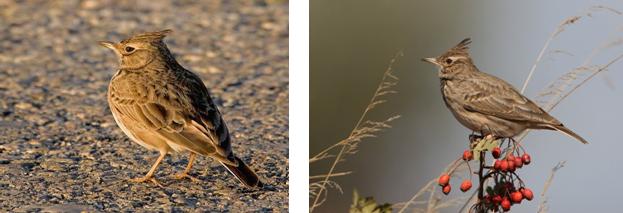TEXT2. GOODBYE, SKYLARKS
Five times in 600 million years most of the creatures of the Earth died off. Now it may be happening again.
Britain's East Midlands were once the picture of English countryside alive with flocks, shepherds, skylarks and buttercups – the stuff of fairytales. In 1941 George Marsh left school at the age of 14 to work as a herdsman in Nottinghamshire, the East Midlands countryside his parents and grandparents farmed. He recalls skylarks nesting in cereal fields which when accidentally disturbed would fly singing into the sky. But in his lifetime Marsh has seen the colour and diversity of his native land fade. Farmers used to grow about a ton of wheat per acre, now they grow four tons. Pesticides have killed off the insects upon which skylarks fed and year-round harvesting has driven the birds from their winter nests. Skylarks are now rare. "Farmers kill anything that affects production", says Marsh. "Agriculture is too efficient".

Anecdotal evidence of looming crisis in biodiversity is now being reinforced by science. In their comprehensive surveys of plants butterflies and birds over the past 20 to 40 years in Britain, ecologists Jeremy Thomas and Carl Stevens found significant population declines in a third of all native species. Butterflies are the furthest along – 71 percent of Britain's 58 species are shrinking in number and some like the large blue and tortoiseshell are already extinct. In Britain's grasslands a key habitat 20 percent of all animal, plant and insect species are on the path to extinction. There's hardly a corner of the country's ecology that isn't affected by this downward spiral.
The problem would be bad enough if it was merely local but it's not: because Britain's temperate ecology is similar to that in so many parts of the world it's the best microcosm scientists have been able to study in detail. In Britain, "the main drivers of change are the same processes responsible for species' declines worldwide", says Thomas. The findings published last week in the journal Science provide the first clear evidence that the world is in the throes of a massive extinction. Thomas and Stevens argue that we are facing a loss of 65 to 95 per cent of the world's species, on the scale of an ice age or the meteorite that may have wiped out the dinosaurs 65 million years ago.
If so this would be only the sixth time such devastation had occurred in the past 600 million years. The other five were associated with one-off events like the ice ages, a volcanic eruption or a meteor. This time ecosystems are dying a thousand deaths – from over-fishing and the razing of the rain forests but also from advances in agriculture. The British study, for instance, finds that one of the biggest problems is nitrogen pollution. Nitrogen is released when fossil fuels burn in cars and power plants – but also when ecologically rich heath-lands are plowed and fertilizers are spread. Nitrogen-rich fertilizers fuel the growth of tall grasses which in turn overshadow and kill off the delicate flowers like harebells and eyebrights.
Many of these practices are being repeated throughout the World, in one form or another that is why scientists believe that the British study has global implications.
Ex.1. Answer the following questions:
- Why does the author call Britain's East Midlands 'the stuff of fairy tales'?
- Why are skylarks rare today in East Midlands?
- Explain and expand on the following: "Farmers kill anything that affects production", says Marsh. "Agriculture is too efficient".
- What anecdotal evidence of looming crisis in biodiversity is described in the article?
- How is this idea reinforced by science?
- Analyze the given information and group it in two parts: 'facts' and 'opinion'.
- The author claims that «the British study has global implications». How does the author prove this point?
Ex.2. Give Russian equivalents for the following:
Most of the creatures of the Earth died off, pesticides, year-round harvesting, anecdotal evidence of looming crisis in biodiversity, comprehensive surveys of plants, butterflies and birds, significant population declines, to shrink in number, to be extinct, to be on the path to extinction, a key habitat, nitrogen pollution, nitrogen-rich fertilizers.